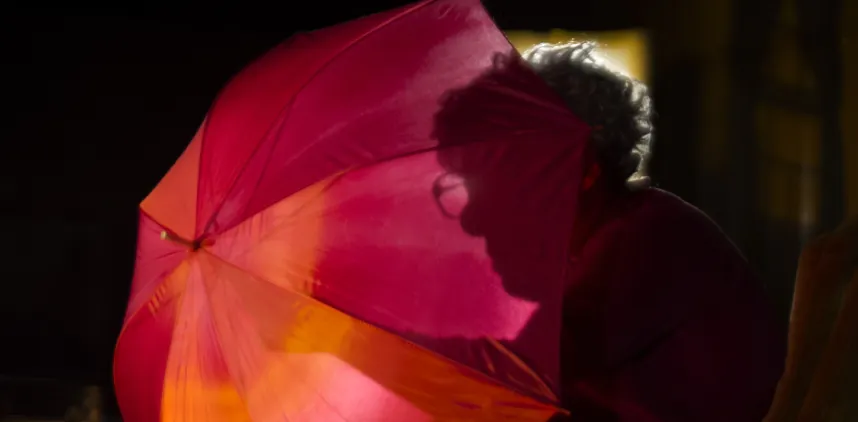(Top: Amelia Van Brunt’s performance of her piece In the Blue of the Evening, originally devised and performed in 2015 during her residency at Circus Center in San Francisco. Photo credit: Shoot That Klown. Second photo:Luminous performance at 2015 Melbourne Fringe Festival
One of the most exciting things about being a professional circus artist is the increasing abundance of training and performance opportunities available to you at residencies and festivals. Of course, not all events are equal in stature and focus, yet each has something to offer the aspiring circus artist looking to break in to the network of global performers.
Still, the path to these opportunities is dimly lit to all but a few brave souls who seek the way. To be invited to perform, you must have a solid concept of your act, clear goals, know your company’s availability, and you must be highly organized. How do you know if your circus company is ready to move to the next level of performing and getting snapped up by circus programmers for tours? We spoke to festival artistic directors and residency directors around the world to see what they recommend to newbies on how to break in to this performance platform and we highlight festivals and residencies that are worth considering.
Residencies
With a residency you can secure a space to develop your work at a circus studio without the regular distractions of home and get valuable feedback from a new audience, collaborate with new artists and explore a new artistic environment.
Also, a residency can be the entrance ramp to a festival, explains Steve Smith, Creative director of Circus Center in San Francisco, California. They offer 6-8 week residencies to circus artists year round (excluding summer camp season). He explains what their residency is and how to know if you are ready for it. “Our residency is absolutely a good stepping stone to festivals. It provides exposure to artists and an audience (that are not friends and family) that will respond authentically. When artists apply to us they are looking to refine a piece of work and take it to the next level; so it’s an incubator. What we offer is space, equipment and time to work through it all. At the end of their program the artist or company offers a workshop as part of our outreach program and they do their show as a capper.”
If huge chunks of time and space to develop yourself or your company’s show seems too good to be true, rest assured there are some caveats, the main two being the need on your part for commitment and clarity of purpose, explains Steve “Residents have to be able to answer questions and articulate what they want. They must bring those intentions fully formed when they get here because this is not an exploration of their inner child or their psyche. It’s for people who are ready to take it to the next level, to start going to festivals with their work and start performing in whatever sense. It doesn’t really matter if it’s in a church basement or a school gymnasium or the finest theater, your audience is your audience.”
Steve says the types of works they see vary widely, as does the type of performer. They’ve worked with soloists and small companies. But what each recipient must have in common beyond a professional approach is a “sense of story, a context, empathy and compassion towards the world to tell their story. If the story is just about ego or personality, we are not interested.” Another more intangible but essential quality Circus Center seeks in their residents is “do they have a pragmatic understanding of what can be achieved in the time they’ll be here and do they understand and demonstrate the potential that lies in all of us to do these strange and wonderful things? We want them to be able to inspire audiences to follow their own dreams.”
Perhaps a good example of the type of resident they consider is Amelia Van Brunt. “Last year, she did a wonderful performance and she is now booking in to festivals. She created a clown character named Mona and the piece is really focusing on dementia, which may seem a bit odd for a clown but the empathy and compassion that she was able to generate takes a very funny look at what happens when we lose our cognitive ability. That was a hard balance to find. The residency was kind of a springboard for her. We were just so pleased that we were able to offer this opportunity for her to put the nuts and bolts together.”
Steve recommends getting an early start planning to apply for any residency. He suggests at least 6 months in advance at Circus Center but the more lead time the better because there is now a waiting list. Steve says that is because “the artists who come here are successful at their work and expanding upon it. Of course, the work may be quite different when they arrive after 6 months of development, because we all work better under a deadline. But the work will evolve as they prepare.”
Festivals
At a festival, your company will be exposed to a new market, and to programmers who will see how your work goes over in a
live venue. You will see how your contemporaries are performing, partake in and even lead workshops and gain professional development insights. The audiences are full of fellow artists and critics looking for trends to pass along and the social media marketing implications are endless. Add to that a fattened up resume with contemporary performances around the world, and you will have a much more intriguing profile to all prospective employers.
(Photo: Marisol deSantis announcing the showcases of the Montreal Completement Cirque Festival at the MICC -International Contemporary Circus Market. Photo credit Marie Andree LeMire.)
Circus Festivals started with the International Circus Festival of Monte Carlo, which has been handing out gold and silver clown awards since 1975. Currently, there are dozens of circus festivals worldwide, both for contemporary and traditional circus performers, though some do not occur annually and not all of the festivals draw the same crowds. Nevertheless, they are growing in popularity along with festival culture in general. The popular fringe festivals which occur in major cities worldwide often have a big circus presence. Alan Gordon does marketing for the oldest and largest of the fringes, Edinburgh. He says that 4% of the program was made up of dance, physical theatre and circus last year, which would total well over one hundred shows. What circus festivals have that other festivals (even ones who welcome circus performances) don’t have is a solid fan base, a large turnout of industry attendees and a genuine insight in to circus trends.
Marisol de Santis is in her 5th year as the circus programming agent for Tohu (Montréal’s indoor circus venue in the Cité des arts du cirque) and for the popular annual festival MONTRÉAL COMPLÈTEMENT CiRQUE. This year the festival will host 9 to 10 indoor shows and 3 or 4 outdoor shows from July 7th until the 17th. Marisol says that the main attraction for performers at the festival is the programmers. “There are a lot of companies that want to come to our festival because there are a lot of programmers here. They come from big venues in Europe; Scandinavia, France, Spain, the UK & Germany. They come here to find performers to program one or two circus shows in their season. We have a lot of Americans and Canadians–even though there’s not a lot of circus festivals in America– there are a lot of programmers from universities and festivals that don’t program only circus. For a circus company, it is really great. They know that if we are programming then it is good, there will be plenty of contacts and maybe a tour.”
This coming year, Marisol and her colleagues will travel around the world to arrange the festival because they don’t believe in hiring an act from video alone. “A company can send me a video and I will watch it, but we don’t program on video. We need to feel part of the audience to know the show– and a show can change a lot. Sometimes we see a show twice.” They also scout the bigger festivals, like Edinburgh Fringe Festival and the Circa festival in Toulouse, where they meet with agents in what Marisol admits is a tight knit community “When you work with agents–it’s a little international community. We know each other very fast.”
But what kind of circus artists are they looking for? Soloists, duos, small companies? Marisol says it all depends on the audience, but in any case, they have that covered too, “At Tohu we have a big venue, so we can have up to 1000 seats. But at other performance spaces in Montreal, we can set up a show at a little venue of 150 seats, or a medium venue 300-500 seats. So we are able to program companies with a lot numbers and artists and a lot of décor but also the little solo or duo that is more intimate for the audience and for what the artist wants to say. We can have a show that has just one discipline even. The word that we say all the time for the festival is ‘diversity’.”
The only constant is the high artistry of the performance, which Marisol admits is advanced, but there is more to it than that. “Our audience is really used to high caliber performance. But it also depends on the character and the story of the show. Contemporary circus now mixes a lot of mediums like theatre, music and dance.”
Although the bar is set very high for this festival, Marisol says the benefits for the artists are worthwhile. Beyond the intangibles like resumé building, MONTRÉAL COMPLÈTEMENT CiRQUE provides compensation for performance, a per diem, transportation, housing, and cargo transportation. A young company would start the process of applying by contacting Marisol at Tohu and inviting them to see the show. Marisol suggests sending a press kit, a recommendation and a video, along with upcoming performance dates up to a year in advance. Each year her team dwindles down 50 applicants to a working group of 20.
Fringe Festivals
Simon Abrahams is the Artistic director of Melbourne Fringe, an open access festival that hosts 400 shows during 2 and half weeks in September. The scope of the work is broad, covering theater, dance, comedy, performance art and of course circus. Although it is not as huge and renowned as the Edinburgh or nearby Adelaide Fringe, Simon explains that works in their favor “Its a 35-year-old festival so we get the whole range; emerging artists, novices and experienced top-of-the line performers who all sit side by side on the same program.”
Simon sees his work as a way to augment the audiences experience and create meaning, making each performance part of something much grander, a hidden benefit to working in a festival setting. “A festival creates a context. With our festival, we are very lucky to have a kind of risk taking audience that is interested in new, innovative and interesting work. So you have an audience that is out for almost anything and we spend a lot of time creating a context so that meaning is created not just within the different artworks but also between the different artworks. Then the festival experience is about navigating those moments of discovery. So when those artists are making their own works—the way they come together and the experience of the audience can often change the work itself by placing it in relation to other works in the festival.”
When explaining how newcomers can navigate an international festival, Simon is reassuring, describing how they assist with citywide marketing and venue selection. “We have a team of people whose job it is to help match artists and venues. In the case of circus, you might need rigging points and a space with a particular height. That may limit you to 5 venues and suddenly that makes the decision making a lot easier. Once they’ve chosen a venue, the venues will market the show on an individual basis but the artist also has a responsibility to market themselves…we provide advice, support, resources and contacts to help artists do that.”
Flo Fitzgerald works in marketing and production for Cirque Bijou, the circus company that has been running the popular Circus & Street Theatre stage at Bristol Harbour Festival since 2003. Her advice for getting your work in to their festival is simple, “Ensure you have a slick and impressive showreel that showcases your skills to send to festival programmers. Also word of mouth is key, if good things are said about you we will want to work with you.”
Steve Smith of Circus Center explained the benefit of residencies and festivals another way, “It’s also about networking and exposure. I’ve worked with Ringling and Big Apple Circus and it does sometimes come down to the old cliché; it’s who you know. People call producers and say ‘Keep an eye out for these people, they’re up-and-comers.’” So, if your circus company is ready to go beyond the occasional gig or short tour, consider preparing for a residency or applying for a festival as motivation to get your work out there.
Circus Festivals
Belgium
Canada
England
Netherlands
USA
Floor To Air Dance – Santa Barbara, California
Chicago Contemporary Circus Festival
Fringe Festivals with Circus
Australia
UK
England- Bristol Harbour Festival
Scotland-Edinburgh Fringe Festival
France
Residencies
Belgium
Brussels
Canada
Tohu Research and Creation Residencies
USA
Circus Center, San Francisco, California
For a more thorough list of festivals, visit the Sideshow Blog or Circus Diaries. For a look at some of the residencies available, visit the Circus Now website.
At Circus Promoters, we are committed to increasing your access to happenings and trends in the worldwide circus community. We also aim to provide access to exclusive interviews with inspiring people in the industry.
If you are not a member of Circus Promoters yet, registration is free and all levels of performer are welcome. Visit circuspromoters.com to create your profile and learn about employment opportunities.
Bio & links:
Kim Campbell is a circus and theatre critic and writer. She has written for Spectacle magazine, Circus Now, Circus Talk and was a resident for Circus Stories, Le Cirque Vu Par with En Piste in 2015 at the Montreal Completement Cirque Festival. She is the editor of American Circus Educators magazine, as well as a staff writer for the web publication Third Coast Review , where she writes about arts and culture. You can follow her frequent musings on circus via Twitter , Instagram or at Kimzyn Chronicles .
Unauthorized use and/or duplication of this material without express and written permission from this site’s author and/or owner is strictly prohibited. Excerpts and links may be used, provided that full and clear credit is given to Circus Promoters and Kim Campbell with appropriate and specific direction to the original content.

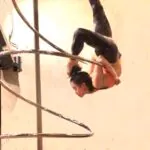 Aerial / Acrobatics
Aerial / Acrobatics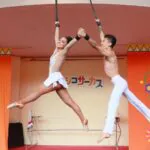 Aerial acrobatics
Aerial acrobatics Aerial Cube / LED Cube
Aerial Cube / LED Cube Aerial Hoop, Lyra, Sphere, Spiral, Heart, Chandelier, Aerial lollipop
Aerial Hoop, Lyra, Sphere, Spiral, Heart, Chandelier, Aerial lollipop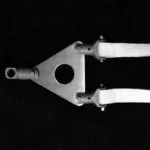 Aerial straps
Aerial straps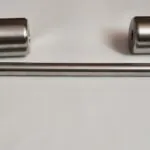 Aerial Trapeze
Aerial Trapeze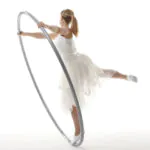 Cyr Wheel / German Wheel / Crossed wheel
Cyr Wheel / German Wheel / Crossed wheel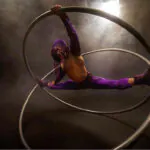 Crossed Wheel
Crossed Wheel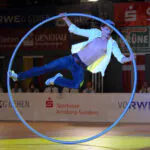 Cyr Wheel
Cyr Wheel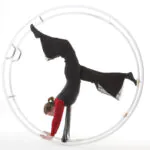 German Wheel / Rhönrad
German Wheel / Rhönrad Cyr Wheel / German Wheel by Zimmermann
Cyr Wheel / German Wheel by Zimmermann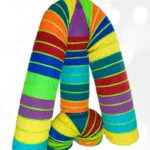 Slinky Costumes
Slinky Costumes Juggling Equipment
Juggling Equipment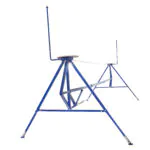 Tight-wire self standing
Tight-wire self standing Pole
Pole Pole dance
Pole dance American Wheel of death
American Wheel of death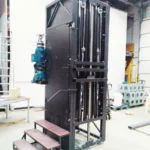 Theatrical Mechanics – Stage Equipment & Rigging Systems
Theatrical Mechanics – Stage Equipment & Rigging Systems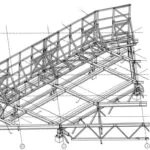 Mobile constructions
Mobile constructions